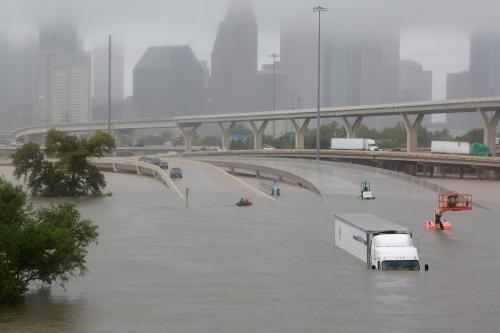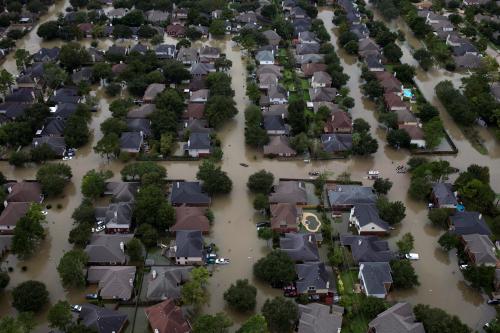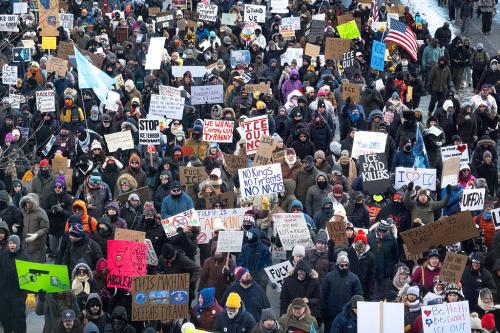Citizenship is so much more than a piece of paper
Hurricane Harvey victims who needed to be rescued from their flooded homes didn’t care if the rescuer was black, white, Latino, or undocumented. In this regard, at least, we treat our undocumented immigrants the same as our citizens. It’s a reminder of what matters most in the world, and paperwork doesn’t even make the list.
The aftermath of Hurricane Harvey brings into focus a primary reason why President Trump needs to continue the Deferred Action for Childhood Arrivals program, or DACA, an Obama administration initiative that allows eligible undocumented residents to stay in the country. There are members of communities like Houston who have shown the substantive nature of citizenship—a commitment to their communities—and we must normalize their status by granting them citizenship.
This issue has come to a head for many undocumented students and their neighbors. Earlier this summer, attorneys general of 10 states laid down a September 5 deadline and ultimatum: eliminate the DACA program or they would file a lawsuit to end it themselves. The timing couldn’t be worse for the undocumented immigrants of Houston.
The Pew Research Center estimates that 575,000 undocumented immigrants resided in the Houston Metropolitan area in 2014—the third-largest undocumented population in the country. The number of undocumented immigrants in the entire U.S. has held steady at 11 million since 2007, according to Pew. Undocumented immigrants are part of a thriving economy. Harris County, of which Houston is the county seat, is ranked as the nation’s third most populated county, with more than 4.6 million residents. Diversity is Houston’s strength. Its labor force is 32 percent white, 19 percent black and 7 percent Asian, with a majority of Latinos at 41 percent. The unemployment rate of 4 percent is slightly below the national average of 4.4 percent. Houston has more high school graduates who could add to the economy, but we must first remove the threat of deportation by continuing DACA.
For undocumented students in Houston, the policymaking storm after the hurricane may prove more devastating. For those who want to kick undocumented people out of the country, the evacuation is a moment of opportunity. It’s not hard to conceive of anti-immigrant groups proposing checkpoints to round up undocumented immigrants as residents move to and from their flooded homes.
Continuing the crusade against DACA in the aftermath of Harvey is inhumane and counterproductive. If there is ever a time to recognize our humanity, it is now.
Houstonians, regardless of race and citizenship status, are rolling up their sleeves to rescue those trapped in their homes, deliver supplies, house and feed the displaced, as well as provide medical services.
“The number of people helping complete strangers is outstanding. They dropped what they were doing and came to help. It’s nice to see people actually have a good side—especially after the incidents recently at Charlottesville,” said Marc Martinez in an NBC News article.
And if there is ever a time to value immigrants, it’s after a city-flattening storm.
The real threat to Houston will not be getting residents back to their communities so they can begin rebuilding. The real threat will be politicos pushing policies that put roadblocks on the city’s recovery. The first line of recovery is the people who live, work, learn and invest in our neighborhoods. Houston has become one of the most diverse cities in the country. Residents of Vietnamese, African, European, and of course Latin descent have made their mark in the palate, sound, architecture and economy of Houston. But the biggest cultural influence is Mexican. As the saying goes, “We didn’t cross the border; the border crossed us.” The attack on DACA is another attack on the Mexicans of Texas and Latinos nationally.
There was a similar effort to remove poor black people from New Orleans after Hurricane Katrina. Many of the areas marked for green space after the storm were areas where the black community thrived. Shuttering the housing projects that didn’t flood was a blatant attack on poor black people. The inability of many residents to return to New Orleans helped exacerbate the post-Katrina blight.
We shouldn’t use undocumented labor to gut the homes, haul the trash and rebuild landscapes—only to turn around and deny those contributions. Yes, we have millions of people who have entered without papers, or overstayed their visas, but they have now become members of our society. Houston is a metaphor for the rest of the country. Kicking out a bunch of kids will do nothing to fix the real problem—our cruel and broken immigration system. Instead, removing DACA will create new ones.
In the throes of the storm, the mayor of Houston, Sylvester Turner, communicated via press conference, Twitter and video to the city’s residents that no one would ask about immigration status at a shelter. The Federal Emergency Management Agency (FEMA) issued a statement on its website that “U.S. Immigration and Customs Enforcement (ICE) and U.S. Customs and Border Protection (CBP) have stated that they are not conducting immigration enforcement at relief sites.” These are responsible actions for the short and long term.
Contributions to a community are the evidence of one’s commitment to it. How folks react in times of tragedy like Hurricane Harvey and its aftermath will show who’s a reliable neighbor, and who is in it for the long haul. These are moments when citizenship is more than a piece of paper. Let us take their example to give back by continuing DACA.
Editor’s note: This story was also published within the Hechinger Report, a nonprofit, independent news organization focused on inequality and innovation in education.
The Brookings Institution is committed to quality, independence, and impact.
We are supported by a diverse array of funders. In line with our values and policies, each Brookings publication represents the sole views of its author(s).







Commentary
Attacking DACA during a national tragedy is divisive and unneighborly
September 1, 2017